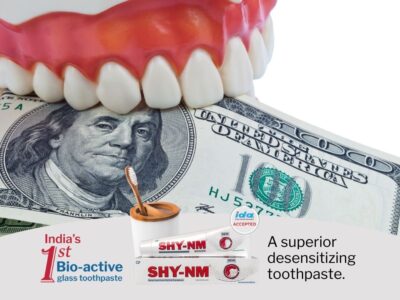Abstract
Being a dentist comes with a set of financial baggage. We might be earning well into high figures, but fixed operational costs, sometimes running student loans, the ever changing high-cost technology, along with figuring out tax woes and retirement savings needs to be managed on priority as the shelf life of a dentists’ peak years is less. All this can inevitably lead to stress. Dentists have a reputation of being bad with finances. The best way to deal with this is getting a financial advisor or training ourselves in financial planning. Financial planning is a must as it inculcates a habit of savings early and if maintained throughout the career can help avoiding stressful situations.

Why are finances stressful for the dentist?
There are a few aspects which would need a bit of monitoring to stress in dentistry due to financial factors. Let us dissect a few of them:
1. Heavy investment in education: Medicine and dentistry is a noble profession as doctors heal sickness, treat diseases, physical, mental trauma and relieve pain. So naturally acquiring this degree is not easy but a result of years of hard work in academics (with or without post-graduation) which additionally costs a fortune. Dentists need to keep updating their skills and educating themselves. There are specialized courses for dentists like dental implantology, rotary endodontics, lasers which take time and are expensive as well. Most of our childhood peers /friends are 22-23 years old when they finish their education and start earning a proper livelihood. In contrast, most dentists get free from education and training usually by 28-30 years of age. So compared to other professions, not only does a dentist invest a lot in his career, but he also starts earning properly much later in life – almost a decade later than the hoi-polloi. This lag of 10 years, where FOMO (Fear of Missing Out) becomes IAMO (I Actually Missed Out), is the first reason of stress.
2. Loans and debts: Loans and debts taken for study, new clinical set up or for expansion eat into a dentist’s income on a monthly basis. The need to invest heavily in the clinic’s high profile look and grand interiors can lead to more loans. Secondly, if we have loans and EMI’s running into several big thousands and we also suffer from poor debt management, it is like an icing on the cake! EMI’s take away from both, our day to day income/savings and any acquired extra interest. Loans can seriously jeopardize investment strategies and put a constraint on the retirement nest egg, thereby, reducing our ability to build a fortune.
3. Lack of financial teachings: Our current education system is broken which just does not prepare us for readiness in aspects of handling our clinics (management), record-keeping/documentation/consent (legalities) and finally, managing our money (finances). None of this is taught in dental schools as a part of the curriculum.
4. Lack of financial knowledge: A common thought is that dentists are often neglectful with their money. They stack up loans, usually spend out too much of what they earn and hardly save for their retirement. After years of studying, exams and struggling on a tight student’s life budget, they start being extravagant when they start earning well, be it nice vacations, expensive cars and a large house; sometimes, on even further loans. This arises primarily because of lack of financial knowledge, poor financial regimen followed and lack of vision of a long-term perspective.
5. Hesitancy to seek help: We as health care professionals are so used to being looked up to, that we find it difficult to seek out advice on anything. It is difficult for us to trust someone else as asking for advice appears to be a sign of vulnerability. Since we are supposed to be self-assured, it is hard for us to appear weak to someone else, like a financial advisor. In addition, there is a bit of a culture within Indian families where talking of finances at home gives one a reputation of being money minded, and hence even asking for help within the family is avoided.
Tax deductions, Mutual fund investments, ITR – Terms we know but do not understand!
Ignorance isn’t bliss anymore. Dental professionals assume that we can make sound financial decisions just because we are qualified to save teeth, but this line of logic is faulty and due to lack of acumen in this area, we can land up in torrid and crunchy times! Tax regulations are changing all the time and for dentists with their own practice and with many income-generating assets, tax returns can be a minefield.
Did you know that there are various ways and strategies which help in converting bad debt (non-deductible) into good (tax-deductible) debt? If we lack this knowledge, we can’t make use of tax-effective investments which ultimately serve a double purpose of growing our wealth and reducing our tax liability in the long term.
On the investment side, we are usually over-awed by TV ads of mutual funds to put in monthly investment as SIP (Systemic Investment Plan), but which fund, which types, how much amount, we don’t understand! This is where we peep on our friends’ or colleagues’ investment portfolio without knowing their actuality of funds and tax structure and I must say; it is a very deep hole to fall in! As said earlier, there are two ways to do this – either do it ourselves by enlarging our knowledge database or seek the help of a genuine professional i.e. the financial consultant to get us back on track.
Now, I must clear here that a chartered accountant (CA) and a financial consultant are usually two different professionals just like the Endodontist and the Oral Surgeon although both are primarily, dentists. I have seen colleagues take full investment guidance from their CA, who is taking care of their ITR. Dentists need sound financial advice just as much as anyone else, but they may be stumped about where to go to find it. We usually have many patients in the form of financial salespersons, but these people may not have our best interests in their mind. A realistic plan devised by a proper financial consultant can transform your monthly EMI’s to monthly savings instead. The biggest effect of this will be on the tax outcome.
10 Financial Do’s and Don’ts for the Dentists
We are fond of giving instructions to our patients as dentists, but when it comes to finance, we ourselves have to follow a few do’s and don’ts or simply, a taste of our own medicine in matters of finance! We have to follow a few cardinal rules to ensure that our finances remain in a healthy condition and don’t lead us to stressful scenarios. Here are some of the mistakes commonly made by us:
1. The temptation to splurge should be curbed once we start earning big bucks. This urge basically stems from our ‘exile’ period when we felt that we missed out on opportunities to have fun because of the IAMO factor. The urge spills on to fancy vacations, new cars, eating out every alternate day at expensive joints etc. It is important to keep a check on our expenditure and concentrate on savings and investments. This doesn’t mean that we totally limit ourselves for the above, but drawing a decent line does help a lot.
2. Busy schedules and time constraints makes us vulnerable. Since we are hard pressed for time, we tend to take a back seat in managing our finances, leading us to either investing in a very unstructured and impromptu manner or handing over the decision making to a non-expert.
3. Prime importance should be given to life insurance cover and disability insurance cover so that in case of unforeseen and unfortunate events, the financial needs of family and profession are taken care of.
4. Incorrect heavy investments in real estate is not a good idea for us, as real estate is just an asset class and totally investing (has been favourite of health care professionals) in it might not be better for overall returns.
5. We end up investing in places which are not in our best interest because of our pre-conceived notion that the objective of tax planning is to minimize the taxes. This blinkered vision often results in unwanted loans, investment in real estate and insurance sector in an unorganized manner.
6. For most of us, our private practice is our biggest investment. So, we must know how to nurture, grow, save & ring-fence it against all sort of evils or threats. Thus, planning for short-term goals for upgrades in clinic can be done best along with the management of the finances.
7. We have to understand that once settled we are not going to face major recessions in our industry (ignoring the smaller ones). Hence, we can afford to take higher risks in our investment assortment portfolio. Being unaware of this or being misguided by non-experts, we tend to over-invest in low-risk low-return products.
8. We should pay off our education loans first and only then go for home loan or loans for buying property to set up our own clinic. The returns on money invested in financial markets are variable and uncertain, but the loan interest is inexorable and certain, making a strong argument for getting rid of the loans as soon as possible.
9. We also have to invest in ourselves by upgrading our skills, learning about new research and developments, newer products, materials via conferences, convocations, seminars, etc. This requires some investment, so decide a percentage of your savings allocated for this.
10. Our financial plan has to be firm and proper, researched well with primary and secondary financial goals listed, and it should be deftly executed to achieve those goals. If there is no time to research and make a plan, outsource the same by hiring the services of a good financial planner who should have a proper investment plan of investing in a variety of assets including equity, mutual funds and debt so that the investment portfolio is diversified, the returns are optimum and appreciated long-term capital wise.
Financial Gimmicks
Overconfidence and gullibility make us easy targets for financial salesmen, who we mistakenly assume to be seriously credentialed professionals like us. A dentist’s contact information can be readily harvested since there are rumours that our associations, software like Practo, listing sites like Just Dial leak our data; our habits and preferences are carefully analyzed and then guided for plans which usually transfuse the assets into the broker’s pockets. We are too busy to cross check or verify any information and easily throw our hard earned money to places where we can feel mentally secure, that yes, we are saving.
There is no shortage of anecdotal evidence that health care professionals are susceptible to goofball investment schemes like extracting gold from sea water, growing money from plants etc. Anything that promises sizzling returns with no taxes looms in our thinking and these days, it is cryptocurrency! Many of us are majorly focused on investments and have a product-centric approach rather than managing our personal finances holistically.
We should ensure that we understand investments and their performance rather than blindly following the advice of the financial planner. We should revisit our financial plan regularly and tweak it as per changes in our life situations and macro/micro economic conditions.
Summary
Ideally, dentists being crème-de-la-crème of brains of society should be cracker-jack investors, but most of us are not adept in financial matters. Financial illiteracy lies in our education system because we have never been taught personal finance or financial planning, so after one starts earning, he will commit mistakes and then learn from them at the cost of money and time. Unfortunately, time is the most valuable asset in finances and the sooner you start; the better the advantage. As dentists, we should be vigilant about financial planning at 25 itself.
There is a specific need to plan the financial needs that includes:
- goal planning
- net worth analysis
- cash flow management and
- asset allocation strategies.
Financial planning involves:
- minimizing taxation
- risk-management
- insurance planning
- succession planning and
- managing the tax liabilities.
Discipline is what is required to overcome stress. With our working schedules being round the clock, we are not able to prioritize financial matters. Thus, to keep our financial life healthy and running on the right track plus to avoid stress, think of expanding your horizons or employing the services of a financial advisor.
Keep money stress at bay with a financial planner in play! ~Dr. Bhavdeep S. Ahuja
To conclude
We lead busy lives but it is important for us to focus on our finances so that we can grow our wealth, manage our taxes and lead a healthy and a secure financial life. Mental security in terms of finances is very important for us to have a long career in our professional field.
Author – Dr Bhavdeep S Ahuja



















Comments